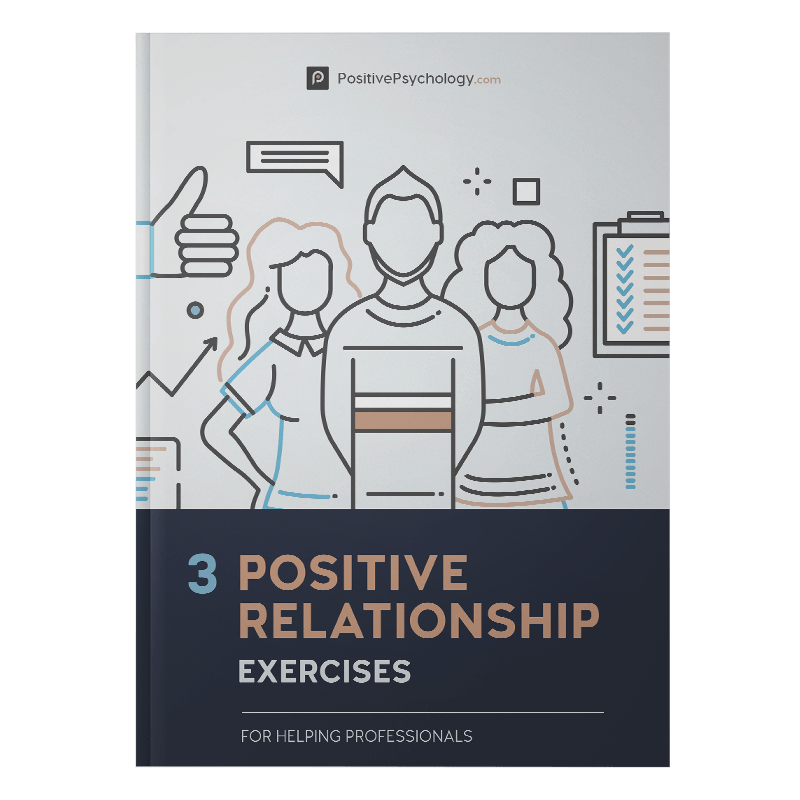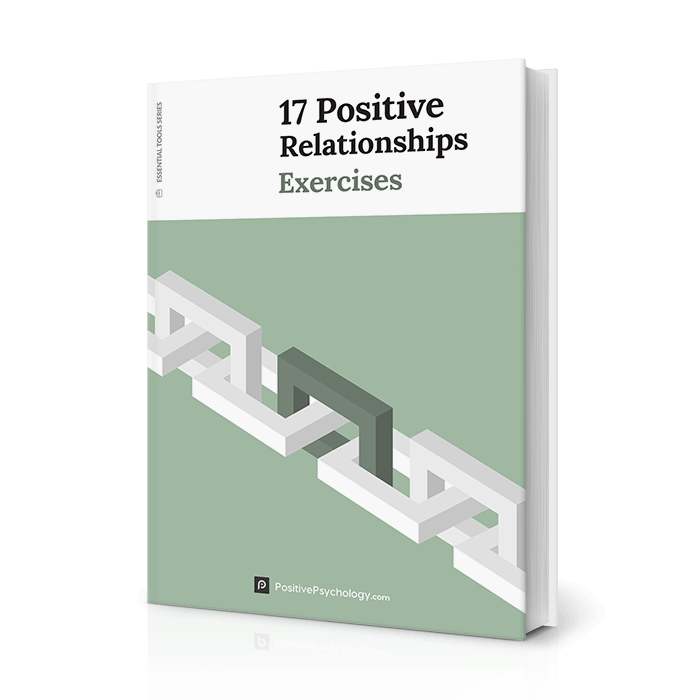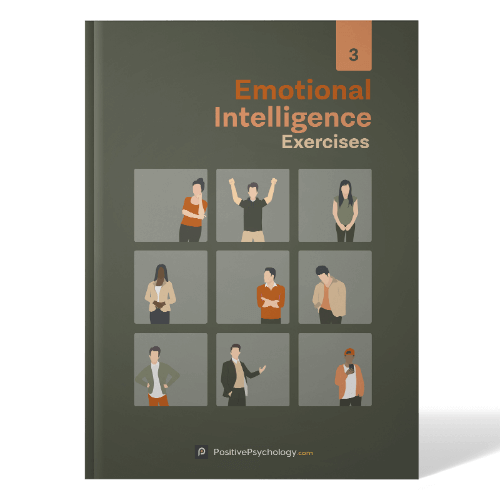11 Anger Management Therapy Techniques and Interventions
 “I saw red.”
“I saw red.”
“He blew a fuse.”
“It made my blood boil.”
“She flew off the handle.”
“They drove me up the wall.”
These are just a handful of the many imaginative idioms we use to describe feeling angry. They don’t paint a very nice picture, do they?
Although anger is considered a bit of a troublemaker, it has an important function. If expressed constructively, anger can actually be useful in society.
Despite anger being a common and natural emotion, many people find it difficult to manage anger effectively or express it in constructive ways. Anger can become a serious problem when dealt with through aggressive and violent means.
In this article, we’ll break down the psychology behind anger management and how anger management therapy works, and share interventions you can use to help clients develop their anger management skills and awareness.
Before you continue, we thought you might like to download our three Positive Relationships Exercises for free. These detailed, science-based exercises will help you or your clients build healthy, life-enriching relationships.
This Article Contains:
- The Psychology Behind Anger Management
- 12 Symptoms of Problematic Anger in Adults
- What Is the Best Therapy for Anger?
- How Does Anger Management Therapy Work?
- 3 Best Interventions & Counseling Tips
- Why Is Anger Management Therapy Important?
- PositivePsychology.com’s Resources
- A Take-Home Message
- References
The Psychology Behind Anger Management
Anger is often portrayed as a “bad,” reckless, or unhelpful emotion. But while anger can sometimes lead to more destructive behavior, it has an important self-protective function that can help bring about social good (Lambert, Eadeh, & Hanson, 2019).
Why do we get angry?
We get angry when we perceive an injustice, believe we have been wronged, or experience provocation that challenges our values or principles (Lambert et al., 2019; Thomas, 2001).
Hostility differs from anger and is generally understood as more of a persistent negative attitude toward others and the world (Thomas, 2001).
Anger can range in intensity from low-level annoyance to fire-breathing fury (Staicu & Cuţov, 2010) and can bring about changes in physiology, such as increased blood pressure (Lochman, Palardy, McElroy, Phillips, & Holmes, 2004).
The origins of anger can be external or internal. Some examples of external anger triggers could be:
- Feeling unfairly treated by your boss
- Believing a romantic partner is taking you for granted
- Being denied equal access to a resource on illegitimate grounds, such as your gender, age, or race
What exactly gets your blood boiling is unique, and many factors could influence how you feel, express, and manage anger, including:
- Learned behavior (e.g., watching how parents express anger)
- Genetic predispositions
- Environment and experiences
- Difficulties with problem solving (Hendricks, Bore, Aslinia, & Morriss, 2013)
Why anger is useful
Anger is a red flag that lets us know when something unjust has happened and action is required to remedy it (Lambert et al., 2019). When appropriate and proportionate, anger can be useful if it motivates us to deal with a perceived threat or correct an unjust situation (Lambert et al., 2019; Thomas, 2001).
Anger can lead to violence, but these terms are not synonymous. People can harm others without being angry, and being angry doesn’t always end in aggression or violence. If anger can be communicated constructively, this could even reduce the chances of aggression if apologies can be made and relationships repaired (Thomas, 2001).
Differences in anger management
Our personal beliefs, principles, and values determine what we perceive to be threatening or unjust in the world. A source of intense anger for one person may not even register on someone else’s radar (Thomas, 2001).
Negative or traumatic experiences in someone’s past may predispose them to anger management issues for various reasons. If you have been let down or abused by people close to you, this can make it more difficult to trust people and assume the best in others. Other mental health issues or low self-esteem can also contribute to anger management difficulties (Priory, 2020).
Our skills in handling and expressing anger also differ. Some people struggle to deal with anger in the moment and may not be able to calm themselves. Other people may have difficulty communicating their emotions calmly and respectfully (Priory, 2020).
12 Symptoms of Problematic Anger in Adults

- Difficulties managing and expressing emotion in healthy ways
- Problems in social, romantic, or work relationships because of behaviors stemming from anger
- Substance misuse and/or addiction
- Turning anger toward the self through self-harm or social withdrawal
- The ability to work or study is impacted by anger or related behavior
- Difficulty negotiating or coming to an agreement with others calmly
- Anger is intense and/or occurs very often
- Being very quick to rise to anger
- Angry feelings continue for a long time
- Getting very angry or violent when drinking alcohol
- Violent, antisocial, or aggressive behavior
- Encountering issues with law enforcement due to anger-related behaviors (Lench, 2004; Priory, 2020; Thomas, 2001)
Ultimately, if anger is not serving your best interests, health, or relationships and/or causing problems in your life, it is likely dysfunctional (Lench, 2004).
Anger management therapy turned things around – Make the Connection
What Is the Best Therapy for Anger?
Most of the research surrounding anger management therapy has focused on Cognitive-Behavioral Therapy (CBT), and as such, CBT has been the dominant form of therapy in this area (Lee & DiGiuseppe, 2018).
CBT and anger management
CBT emphasizes important links between how we feel, the thoughts and beliefs we have, and the behaviors we carry out and is a highly effective treatment for psychiatric and nonclinical groups (Lee & DiGiuseppe, 2018).
A meta-analysis combining 50 studies and 1,640 participants found that people receiving CBT for anger had more positive outcomes than 76% of people who didn’t have treatment (Beck & Fernandez, 1998).
CBT anger management interventions have been effective at helping a variety of populations, such as people with high blood pressure, angry drivers, people in prison, college students, police officers, and parents (Deffenbacher, Oetting & DiGiuseppe, 2002).
How Does Anger Management Therapy Work?

Relaxation-based interventions
Relaxation-based interventions deal with the emotional and physiological experience of anger.
People learn to use relaxation to cope with anger and lower their arousal. Being in a more relaxed frame of mind can help people think through their behaviors and use their skills in conflict management and problem solving (Deffenbacher et al., 2002).
Stress inoculation
During stress inoculation training, individuals rehearse an internal dialogue to walk themselves through how they would deal with an anger-inducing situation.
They may create a repertoire of coping statements or think through how they will challenge negative appraisals of the situation.
Through practicing this self-guiding dialogue, they can begin to approach situations with greater self-control and lower levels of arousal (Deffenbacher et al., 2002).
Cognitive restructuring
Cognitive restructuring begins as an error-finding mission, where clients are supported to recognize dysfunctional or biased beliefs and thinking processes that lead to anger, such as overly personalizing comments from others or unhelpful beliefs such as “people never listen to me.”
Clients are then supported to develop alternative thinking processes that are more helpful, rational, and aligned with reality (Deffenbacher et al., 2002).
Social skills training
Social skills interventions aim to reduce destructive and antagonistic behaviors and help people develop stronger communication and conflict management skills.
Some skills the client is supported to develop are listening and assertiveness, thinking about the impact of their behavior on others, and negotiation (Deffenbacher et al., 2002).
Being able to communicate more effectively can reduce anger in itself, and improving skills to deal with anger-inducing situations can stop conflict from spiraling (Deffenbacher et al., 2002).
3 Best Interventions & Counseling Tips
There are many ways to help clients notice, express, and manage their anger in more constructive ways. Importantly, anger management therapy is not likely to be appropriate for people with certain conditions, such as neurological disorders, psychosis, personality disorders, or paranoia (Thomas, 2001).
Below, we’ve listed some interventions that may be helpful when working with someone with problematic anger.
Retreat, rethink, respond
This simple intervention supports clients to think about how they can postpone reacting angrily to a situation. A typical negative reaction pattern is to react (e.g., shout at someone), retreat (remove yourself from the situation or be removed), and then rethink (go over your actions and what you could have done differently) after the damage is done.
To disrupt this negative cycle, you can help the client work out how they could shift this habitual reaction to first retreat to a mental space, rethink the event, and then respond more thoughtfully (Schimmel & Jacobs, 2011).
The 7/11 technique
In the heat of the moment, it can be helpful for clients to reach for a tried-and-tested anger management breathing technique to help them relax, clear their mind, and activate their parasympathetic (“rest and digest”) nervous system (Tyrrell, 2018).
Help your client practice these steps when they next feel angry:
- Stop and focus on your breath
- Breathe in for a quick count of 7
- Breathe out for a quick count of 11
- Keep going for at least 1 minute
- Reflect on the consequences of responding from this more relaxed place (Tyrrell, 2018)
Norman Cotterell’s 7 steps for anger
Norman Cotterell, PhD, is a senior clinician at the Beck Institute for Cognitive Behavioral Therapy and advocates a seven-step intervention for anger management.
Preparation: Cost–benefit analysis
Before delving into the interventions, Cotterell (2021) suggests a simple way to empower clients to choose to address problematic anger is to do a cost–benefit analysis.
Here’s how it goes:
- Ask the client to write down qualities of someone who manages their anger in a way they admire.
- Next, ask them to weigh up the costs and benefits of being like this person and the costs and benefits of getting angry.
- Ask the client to give a rating of how important each cost and benefit is.
- Tally up the scores at the end and ask the client whether the costs outweigh the benefits of continuing to be angry. Do the same with the costs/benefits of being like the person they admire. (Cotterell, 2021)
Step 1: What “should” rule is broken?
Anger is triggered when one of our “should” rules is broken; for example, “They should be honest with me” or “He should return my call.” Acknowledging which rule is broken gives us the choice to accept what’s happened or continue to fight against it.
“Should” rules also hint at what our positive values are, which can be helpful to reflect on. For example, “he should pay for half” could show that you care about fairness and equality (Cotterell, 2021).
The client is then asked to think about what they would like for themselves long term and how they can constructively deal with rule-breaking situations while still acting in line with their values (Cotterell, 2021).
Step 2: What is hurtful or scary about this rule being broken?
Explore why it’s painful that someone breaks your rules. What does that signal to you? Does it confirm negative beliefs you have about others or yourself?
Here, it’s useful to explore the evidence for their beliefs and consider more helpful ways of interpreting the behavior of others (Cotterell, 2021).
Step 3: “Hot thoughts”
Identify thoughts that are very “hot” or emotional and try to change reactive thoughts; for example, change “He’s an idiot” to the more reflective thought, “He made an honest mistake” (Cotterell, 2021).
Step 4: Anger
Learning to manage the arousal associated with anger can be done with classic relaxation practices, such as visualizations and progressive muscle relaxation. Cotterell (2021) suggests you could also explore anger as a source of energy that can be useful when it’s directed toward realizing our values and principles.
When anger results in behaviors that we would judge to be unacceptable or immoral, it can become hypocritical (Cotterell, 2021).
Step 5: Moral Disengagement
Explore any beliefs or justifications for using anger destructively, such as “He started it” or “They were deliberately pushing my buttons.”
These rationalizations essentially make us feel better about doing bad things. Encourage the client to assess the pros and cons of these justifications and what they can gain from having greater patience and empathy for others (Cotterell, 2021).
Step 6: Aggression
This step involves taking a closer look at the problematic behaviors stemming from anger. The client can be asked to empathize with people who make them feel angry or whom they act aggressively toward. This is a perspective-taking exercise to help the client manage their anger, the anger of others, and increase opportunities for constructive communication (Cotterell, 2021).
Step 7: Outcome
In this final stage, you can work with the client to decrease feelings of guilt and to understand that if they experience anger episodes again, they are not a failure. Each time this happens is an opportunity to learn and to disrupt the anger cycle with the strategies and skills they’ve acquired (Cotterell, 2021).
Why Is Anger Management Therapy Important?

It can lead to job problems, relationship breakdowns, and even criminal charges (Priory, 2020).
Anger in the longer term can also be bad for our health. Regularly experiencing negative emotions like anger can lead to chronic activation of the body’s stress response system (Davidson & Mostofsky, 2010).
One 10-year study found that lower levels of constructive anger and higher levels of destructive anger justification in men and women are linked to increased risk for coronary heart disease (Davidson & Mostofsky, 2010).
Anger can also lead to unhealthy lifestyle choices and has been linked with the development of type 2 diabetes, possibly because of inflammation associated with a stressed-out body or as a result of poor health behaviors (Staicu & Cuţov, 2010).
Anger that is managed through destructive and aggressive means can lead to violence, domestic abuse, bullying, or abusive parenting practices (Deffenbacher et al., 2002).
Being able to communicate anger in constructive ways is healthy, can enhance relationships, and helps avoid unnecessary conflict or aggression.
PositivePsychology.com’s Resources
If you’re currently working with a client to improve their anger management skills and awareness, these free tools and exercises may come in handy for your sessions.
- Anger Exit and Re-Entry
This worksheet helps clients recognize when best to disengage from conflict or difficult conversations, cool down, and re-engage later to facilitate greater insight and joint problem-solving. - Neutralizing Judgmental Thoughts
This exercise helps clients recognize judgmental thoughts and “should” viewpoints and replace them with less critical alternatives. - Countdown to Calmness
This mindfulness exercise invites clients to use all five senses to ground themselves, induce calm, and mindfully accept things the way they are. - Impact of My Anger
This worksheet helps clients capture examples of behavior spurred by anger to consider who has been impacted by it and how. - Anger Management for Teens: Helpful Worksheets & Resources
This article is dedicated to providing specific resources for anger management pertaining teens, a period when life challenges require a unique understanding. - Anger Management for Kids: 14 Best Activities & Worksheets
Similar to our teens article, anger management for kids deals with the unique challenges of helping children resolve these challenging emotional problems. - 15 Anger Management Tests & Quizzes to Use in Your Sessions
This article containing anger management tests has many practical and valuable resources for your practice. - 14 Anger Management Books & Workbooks for Therapists & Kids
Even if you are not a book worm, you’ll be able to pick and choose from 14 books on anger management to find the one best suited to you. - 17 Positive Relationship Exercises
If you’re looking for more science-based ways to help others build healthy relationships, this collection contains 17 validated positive relationships tools for practitioners. Use them to help others form healthier, more nurturing, and life-enriching relationships.
A Take-Home Message
Anger is a natural emotion that can be useful and highly functional in society. But, as Aristotle put it:
Anybody can become angry—that is easy, but to be angry with the right person and to the right degree and at the right time and for the right purpose, and in the right way—that is not within everybody’s power and is not easy.
It’s true, managing our anger can be hard, especially if we haven’t learned skills to express anger constructively. When anger becomes a problem, it can have serious repercussions for the angry individual and those around them.
Thankfully, most of us can develop our anger management skills. Cognitive-Behavioral Therapy is a highly effective anger management therapy. It works by empowering people to see how their thinking processes and beliefs can be a catalyst for anger and aggressive behaviors, and encourages them to learn alternative and more helpful thinking strategies and coping mechanisms to deal with anger when it does arise.
We hope you enjoyed reading this article. Don’t forget to download our three Positive Relationships Exercises for free.
- Beck, R., & Fernandez, E. (1998). Cognitive-behavioral therapy in the treatment of anger: A meta-analysis. Cognitive Therapy and Research, 22(1), 63–74.
- Cotterell, N. (2021, June 8). Seven steps for anger. The Beck Institute for Cognitive Behavior Therapy. Retrieved from https://beckinstitute.org/blog/seven-steps-for-anger/
- Davidson, K. W., & Mostofsky, E. (2010). Anger expression and risk of coronary heart disease: Evidence from the Nova Scotia Health Survey. American Heart Journal, 159(2), 199–206.
- Deffenbacher, J. L., Oetting, E. R., & DiGiuseppe, R. A. (2002). Principles of empirically supported interventions applied to anger management. The Counseling Psychologist, 30, 262–280.
- Hendricks, L., Bore, S., Aslinia, D., & Morriss, G. (2013). The effects of anger on the brain and body. National Forum Journal of Counseling and Addiction, 2(1), 1–12.
- Lambert, A. J., Eadeh, F. R., & Hanson, E. J. (2019). Anger and its consequences for judgment and behavior: Recent developments in social and political psychology. Advances in Experimental Social Psychology, 59, 103–173.
- Lee, A. H., & DiGiuseppe, R. (2018). Anger and aggression treatments: A review of meta-analyses. Current Opinion in Psychology, 19, 65–74.
- Lench, H. C. (2004). Anger management: Diagnostic differences and treatment implications. Journal of Social and Clinical Psychology, 23(4), 512–531.
- Lochman, J. E., Palardy, N. R., McElroy, H. K., Phillips, N., & Holmes, K. J. (2004). Anger management interventions. Journal of Early and Intensive Behavior Intervention, 1(1), 47–56.
- Priory. (2020). Anger management symptoms. Retrieved from https://www.priorygroup.com/mental-health/anger-management/symptoms-of-anger-management
- Schimmel, C. J, & Jacobs, E. (2011). Ten creative counseling techniques for helping clients deal with anger. VISTAS Online, 53. American Counseling Association.
- Staicu, M. L., & Cuţov, M. (2010). Anger and health risk behaviors. Journal of Medicine and Life, 3(4), 372–375.
- Thomas, S. P. (2001). Teaching healthy anger management. Perspectives in Psychiatric Care, 37, 41–48.
- Tyrrell, M. (2018, May 7). How to use CBT for anger management. Mark Tyrrell’s Therapy Skills. Retrieved from https://www.unk.com/blog/how-to-use-cbt-for-anger-management/
Let us know your thoughts
Read other articles by their category
- Body & Brain (49)
- Coaching & Application (57)
- Compassion (26)
- Counseling (51)
- Emotional Intelligence (24)
- Gratitude (18)
- Grief & Bereavement (21)
- Happiness & SWB (40)
- Meaning & Values (26)
- Meditation (20)
- Mindfulness (45)
- Motivation & Goals (45)
- Optimism & Mindset (34)
- Positive CBT (28)
- Positive Communication (20)
- Positive Education (47)
- Positive Emotions (32)
- Positive Leadership (18)
- Positive Parenting (4)
- Positive Psychology (33)
- Positive Workplace (37)
- Productivity (16)
- Relationships (46)
- Resilience & Coping (36)
- Self Awareness (21)
- Self Esteem (38)
- Strengths & Virtues (31)
- Stress & Burnout Prevention (34)
- Theory & Books (46)
- Therapy Exercises (37)
- Types of Therapy (64)






What our readers think
Je tenais à prendre un moment pour vous féliciter chaleureusement pour votre article inspirant et captivant !
thank you for doing good work to help those who can’t control their anger. I am sure that a reader who is looking for very useful information about how to deal with his or her anger will be so happy to read all these so good information. thank you so much to Dr. Brown for the helpful work.
Hello Sir/Mam
Request for anger counselling for my Son
Hi Esther,
I’m afraid we don’t provide counselling services through our site. However, Psychology Today has a great directory you can use to find therapists in your local area. Usually, the therapists provide a summary in their profile with their areas of expertise and types of issues they are used to working with: https://www.psychologytoday.com/us/therapists
I hope this helps.
– Nicole | Community Manager
It would be nice if there would be some more exercises, with the articles. The reason I say that is because some people don’t have the money to get these exercises all the time. So, if there were some more exercises, we can help those brothers and sisters, that’s having behavior problems. As a case manager, I don’t make enough money to be buying these exercises all the time’s.
Hi Carlos,
You’ll find a range of free anger management exercises and activities in our Anger Management Guide blog post, which includes anger diary templates and reflections. Perhaps these will help!
– Nicole | Community Manager